The first major use case for Generative AI was personalization. Moreover, it remains one of its most powerful applications, especially in marketing and customer support. According to LTIMindtree, 81% of business leaders point to personal client experiences as the main goal driving their adoption of Generative AI and personalization. Furthermore, it’s often seen as the key use case in many industries.
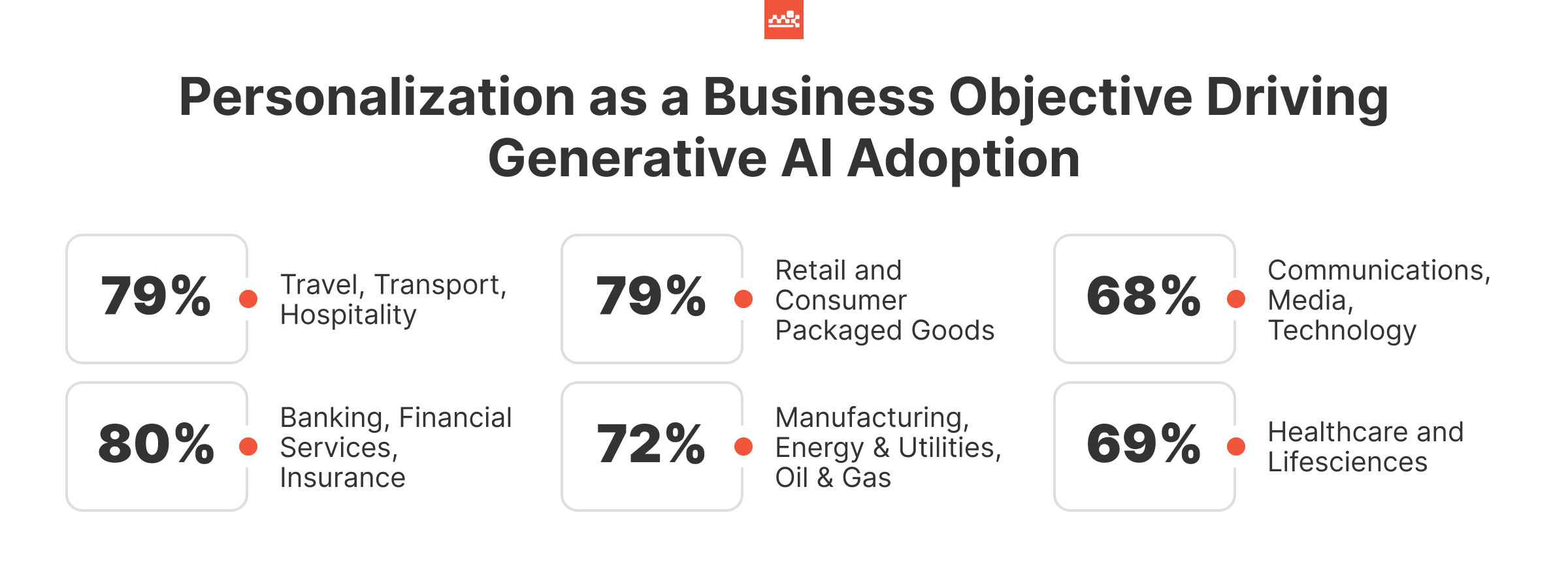
Gartner’s research also indicates that by 2026, 30% of new applications will employ AI to create personalized adaptive user interfaces. This is a substantial increase from less than 5% today. Therefore, personalization has become a crucial strategy for businesses striving for market leadership. The introduction of Generative AI has revolutionized this area, enabling unparalleled customization and interaction levels.
In this article, we delve into how artificial intelligence is changing the personalization landscape, its distinctions from traditional methods, and the challenges it brings for companies. With this insight, businesses can more effectively adopt or improve their AI-driven personalization strategies.
Table of Contents
Understanding Generative Personalization
Gartner defines personalization as creating relevant, individualized interactions to enhance the recipient’s experience. Companies can customize user path or communication methods using information about their prospects and customers. This ranges from digital ads and websites to online chats and contact centers.
Personalization has been around for some time. Traditional methods include manual content curation, segmentation-based customization, basic behavioral triggers, static user profiles, and surveys. These techniques are easy to implement, provide consistent experiences, and observe well-understood marketing principles. However, they often lack real-time responsiveness, fail to address individual needs, and struggle with scalability and adaptability to changing consumer behaviors.
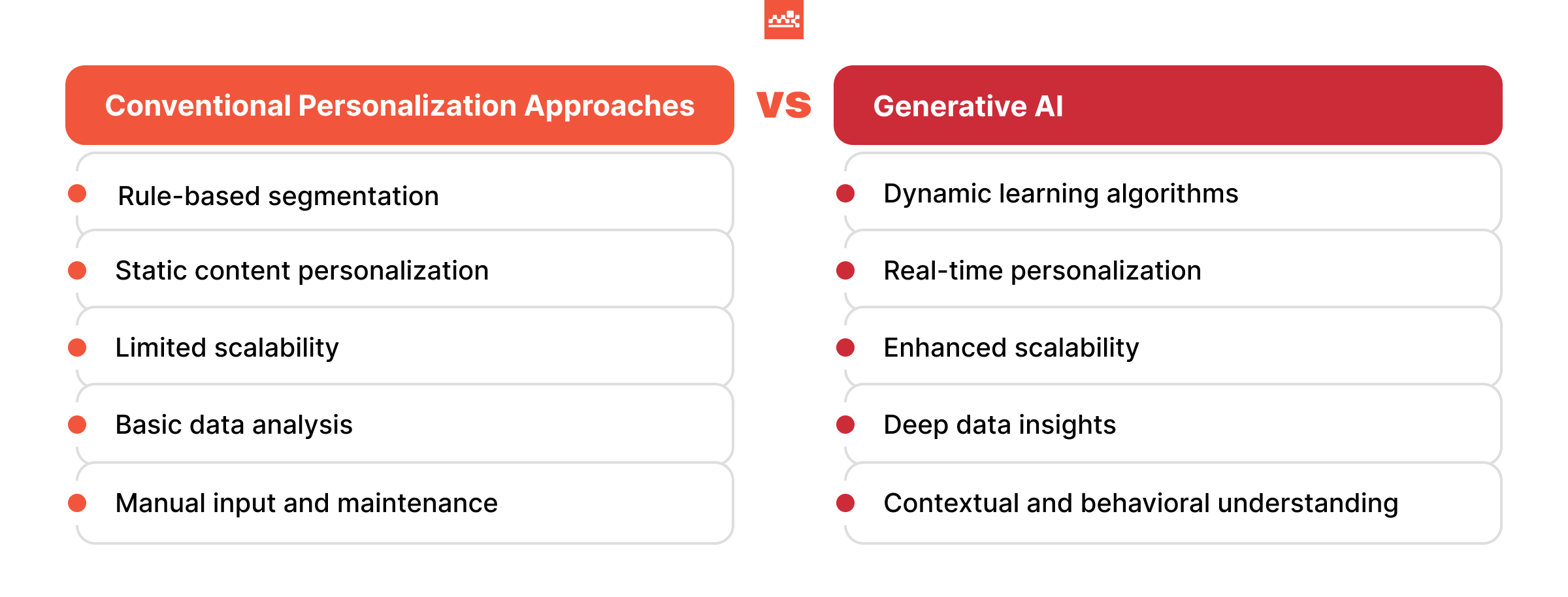
Generative personalization, based on artificial intelligence, is transforming this landscape. It creates unique client engagements by analyzing extensive data to understand each user’s preferences and behaviors. In fact, about 90% of marketing and customer experience leaders see Gen AI as key to better targeting and personalization, opening new buyer journeys and audiences.
This approach involves sophisticated AI algorithms, up-to-date data analysis, and dynamic content generation. It offers tailored, real-time experiences, adapts to individual requirements, and learns and improves continuously. Challenges include its complexity, potential privacy concerns, and the need for ongoing refinement to accurately interpret diverse user interactions.
Nevertheless, customers appreciate the convenience of generative personalization. About 47% enjoy personalized deals aligned with their buying needs, with 42% interested in customized product recommendations. Moreover, personalization increases trust in retailers (24.8%), makes shopping less overwhelming (37.7%), and helps buyers feel understood (31.5%). Thus, businesses using such a method gain a competitive edge and strategic advantage.
Let’s now look at how Gen AI can be specifically applied in this context.
Key Applications of Generative AI for Personalization
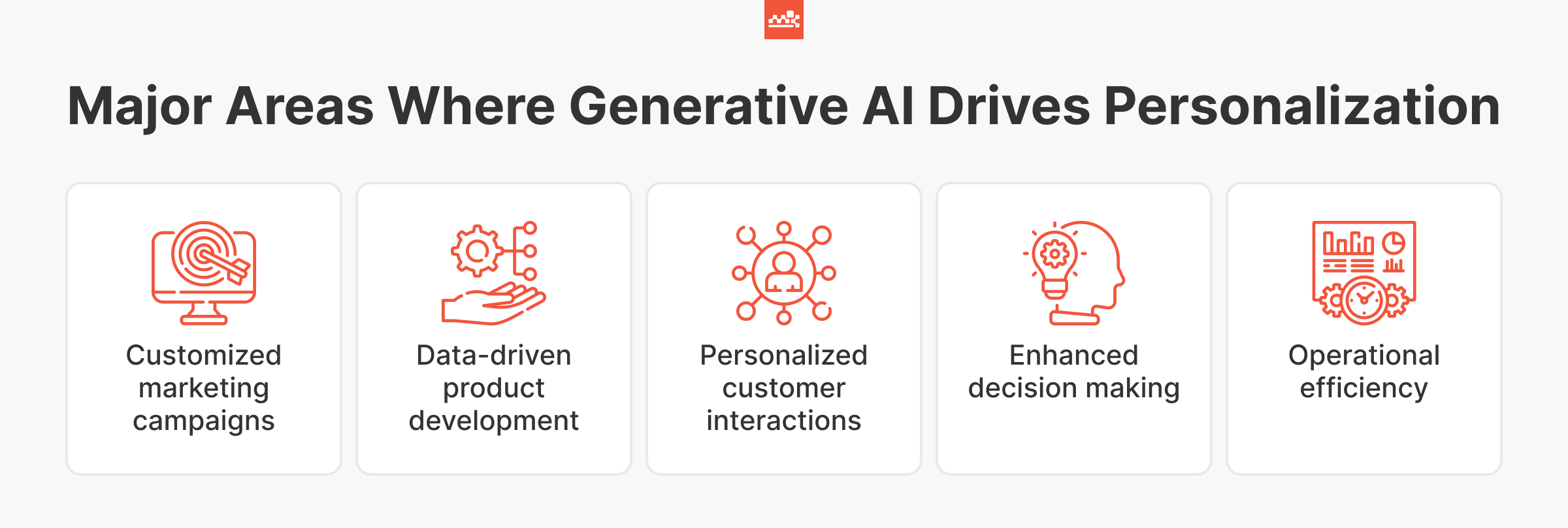
Personalized Customer Interactions
Generative AI tailors customer interactions in real-time, adapting to individual behaviors and preferences. This technology analyzes client data, enabling businesses to offer personalized recommendations and responses. For instance, AI-driven chatbots and virtual assistants use natural language processing to understand and engage with customers effectively. They provide instant, relevant solutions and suggestions, enhancing the user experience significantly.
The implementation of such tools transforms support services from generic to highly customer-centric interactions, leveraging personalized messaging with Generative AI insights. By continuously learning from dialogues, these systems become adept at predicting consumer needs and tastes. This leads to increased buyer satisfaction and loyalty, as communication feels more intuitive and less scripted.
Customized Marketing Campaigns
The use of Generative AI for content personalization allows marketers to automate the process and focus on specific customer segments. It leverages client data to produce highly relevant and engaging materials. This includes personalized emails, targeted advertisements, and even customized product recommendations. Such tailored information resonates more with consumers, leading to higher engagement rates.
Dynamic ad targeting is another key application of the technology. Gen AI analyzes user behavior and preferences to display the most appropriate ads. This not only improves consumer journeys but also increases the effectiveness of marketing campaigns. The AI’s ability to constantly advance and adapt ensures that business strategies remain valid over time.
Data-Driven Product Development
The analysis of personalized customer conversations with AI and users’ feedback pinpoints key areas for product enhancement. It sifts through comments and reviews, uncovering common trends and identifying actual client needs. This targeted method ensures that merchandise improvements align with buyer expectations and demands.
AI-powered tools can also be used to create customized offerings based on insights from shopper data. This approach leads to the manufacturing of goods tailored to specific customer segments. As a result, businesses offer products that resonate with individual consumers, boosting satisfaction and market appeal.
Enhanced Decision Making
Generative AI greatly influences marketing decision-making with its predictive analytics capabilities. It projects future trends and customer behaviors, offering critical insights for strategic planning. These details allow for more precise and impactful promotional initiatives.
Additionally, AI-driven observations deepen the understanding of client needs. By processing extensive data, artificial intelligence reveals subtle patterns and preferences, providing a comprehensive view of user behavior. Armed with this information, businesses can adjust their strategies to better resonate with consumer expectations, ensuring they stay ahead in rapidly evolving markets.
Operational Efficiency
Streamlining operations is one of the major benefits of Generative AI implementation. It automates routine tasks, freeing up human resources for more complex activities. This not only increases business efficiency but also reduces the likelihood of employee error.
Cost reduction is another significant advantage. By optimizing processes and reducing the need for manual intervention, AI helps in lowering operational expenses. This capability is particularly beneficial for large-scale operations, where even small optimizations can lead to substantial savings.
Scalability and Integration with Existing Systems

Integrating Generative AI for personalization into existing marketing and IT infrastructures presents unique challenges. One primary issue is the compatibility of new technologies with legacy systems. To address this, companies often adopt middleware solutions that act as a bridge between old and recent structures. The approach allows for the gradual integration of the technology, minimizing disruptions to workflows. Moreover, cloud-based AI solutions offer flexibility, enabling businesses to expand artificial intelligence capabilities as needed without overhauling their entire infrastructure.
It is imperative to consider scalability when incorporating Gen AI, particularly in the context of large-scale operations. As organizations grow, their systems must adapt to handle increased data volumes and more complex decision-making processes. Scalable tools are designed with this in mind, featuring modular architectures that can be expanded or modified. This adaptability ensures that as the business grows, its LLM model can be upgraded correspondingly. The use of elastic cloud services and adaptable algorithms is key to achieving such versatility.
At Master of Code Global, our expertise lies in providing specialized Generative AI development, focusing on tailor-made solutions. We adeptly integrate selected LLMs into diverse platforms and instruments, ensuring seamless functioning. Our team enhances the performance of your conversational solutions by seamlessly connecting with your unique data, knowledge base, and backend systems through API. Additionally, we offer continuous maintenance to keep the AI applications up-to-date.
Collaborating with reputable partners, such as Master of Code Global, is crucial for navigating the challenges and concerns associated with integrating Generative AI. These critical aspects will be the focus of our discussion in the next section.
Data Privacy and Ethical Considerations
Addressing privacy concerns is paramount, especially when implementing Gen AI in personalization. The ethical use of customer data demands transparent details collection, obtaining explicit consent, and responsible utilization of information. Businesses must adhere to moral principles that respect user privacy and preferences. Such an approach guarantees consumer safety and builds trust between the brand and clients.
Observation of legislation, such as the General Data Protection Regulation (GDPR) and the California Consumer Privacy Act (CCPA), is another critical aspect of protecting individuals’ privacy. These rules require companies to maintain stringent data handling and storage protocols. Ensuring compliance involves regular audits, information defense impact assessments, and the implementation of robust security measures. Adherence to the legal frameworks prevents potential repercussions and reinforces risk management mechanisms.
One more major challenge related to generative personalization is balancing creativity and automation. While artificial intelligence offers innovative capabilities for personalizing customer experiences, it is essential to maintain a level of human oversight. Hence, AI-generated content will align with ethical standards and the brand’s values. It is about striking the right balance between realizing AI’s potential and maintaining a human touch that respects user boundaries and cultural contexts.
In essence, an alliance with a trusted tech company provides invaluable guidance and expertise in managing the challenges of Generative AI integration. Their support ensures ethical data usage, legal compliance, and a seamless combination of AI-driven innovation and human insight. Such an approach is fundamental for building trust and strengthening the integrity of client interactions in today’s digital landscape.
How Renowned Companies Leveled Up Their Personalization Using Generative AI
Let’s explore the top three Generative AI examples in personalization across various industries to gain a clearer understanding of its actual potential.
Gen AI-Powered Onboarding Chatbot
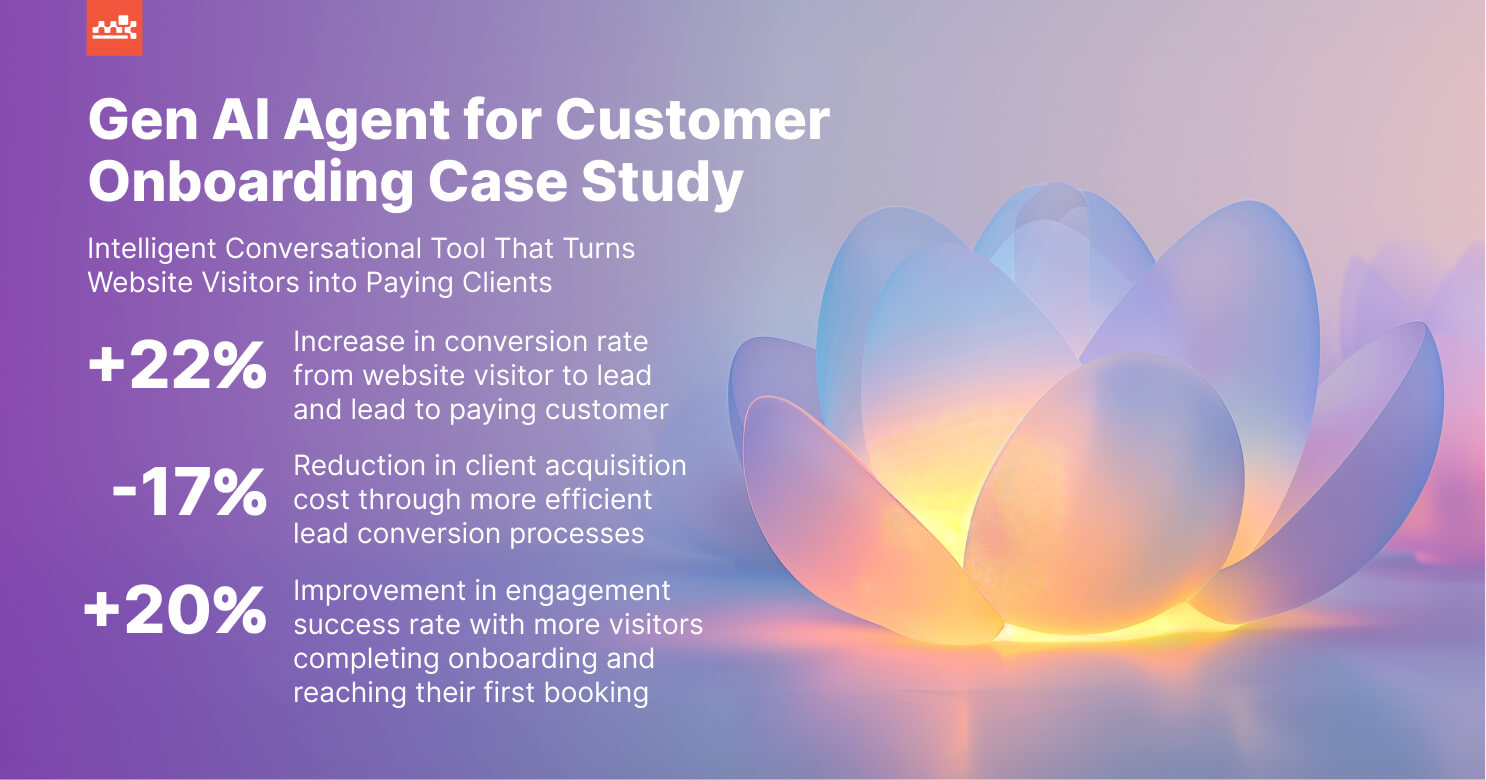
Master of Code Global developed a Gen AI-powered conversational agent for a client’s website, streamlining the onboarding process and enhancing user engagement. The tool guided visitors through the conversion journey by providing personalized, real-time assistance, using Route AI and Knowledge AI with Retrieval-Augmented Generation (RAG) to deliver accurate, context-specific responses. As a result, the initiative led to a 22% increase in conversion rates, a 17% reduction in client acquisition costs, and a 20% improvement in engagement, with more visitors completing onboarding and booking their first purchase.
BloomsyBox Personalized Gen AI-Powered Chatbot
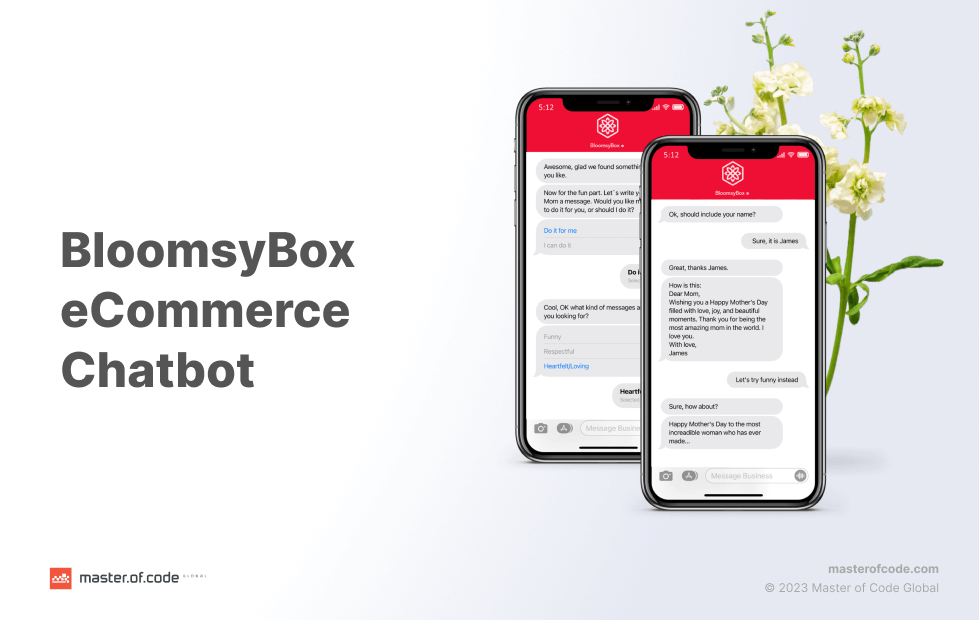
BloomsyBox, a floral subscription company, enhanced user engagement with a personalized eCommerce bot powered by Generative AI. This tool, crucial for the brand’s Mother’s Day campaign, allowed clients to win a bouquet by correctly answering questions. As a result, 60% of participants completed the quiz, and 28% won a free bouquet. The innovative assistant, developed using Master of Code Global’s LLM Orchestration Framework Toolkit (LOFT), significantly boosted customer interaction and satisfaction.
Continue reading: More about How to Use Generative AI in E-commerce
JPMorgan Chase’s IndexGPT
JPMorgan Chase is creating IndexGPT, an AI service akin to ChatGPT, designed to offer personalized investment advice. Using GPT models it analyzes and selects financial securities that align with customer profiles. IndexGPT stands out for its ability to provide tailored investment strategies. It leverages cloud computing and artificial intelligence for deep analysis of client needs. This marks a significant shift towards more customized, AI-driven planning and portfolio management.
Tripadvisor’s AI-Powered Personalized Itinerary Generator
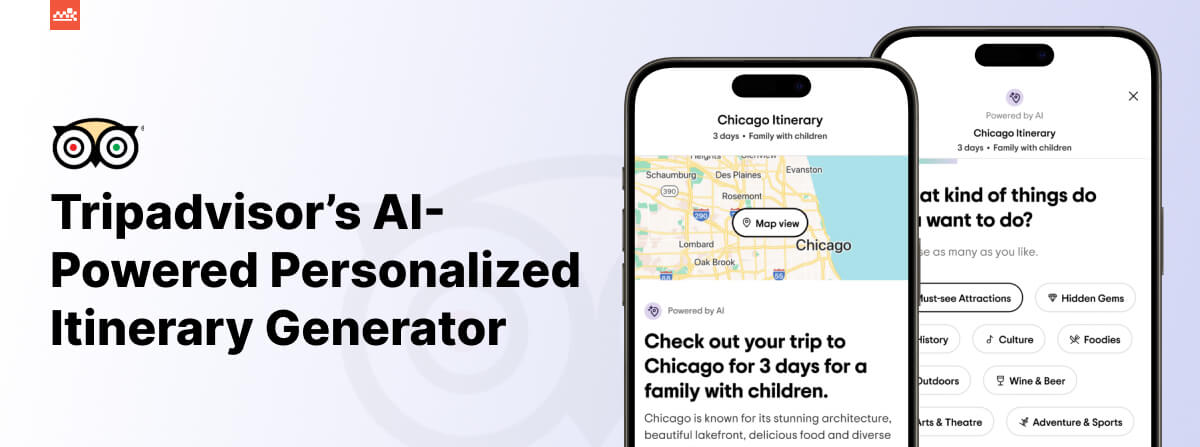
Tripadvisor has enhanced its trip planning product, Trips, with an AI-powered itinerary generator using OpenAI’s technology. This feature creates personalized travel plans by using insights from over a billion of travelers’ reviews. Users input journey details to receive a customized, day-by-day itinerary, which can be edited and shared. This innovative approach marks a significant step in utilizing the technology for personalized tourism, aiming to transform the way customers plan and book trips.
Conclusion
Artificial intelligence is revolutionizing the way businesses approach customer-centric strategies. Generative AI now enables us to attain a level of personalization that was once considered unattainable. The impact of the technology across various sectors demonstrates a clear shift towards more dynamic, data-driven client experiences. Enterprises have to adapt to the latest standards in industry leadership and user engagement.
Ready to fortify your brand identity and foster customer loyalty through personalized approaches? Partner with Master of Code Global to integrate Gen AI solutions into the operations propelling you to the forefront of innovation and market changes. Let’s redefine how you connect with your audience.






